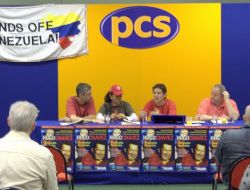As part of their visit to Britain in May 2010 to attend the Hands
Off Venezuela conference, Venezuelan revolutionaries Katy Jaimes and
Elias Chacón also spoke at fringe meetings at the conferences of the
Public Commercial and Services Union in Brighton and the Communication
Workers Union in Bournemouth.
At
PCS conference a motion had been submitted by the DEFRA Marine
Fisheries Agency branch to disaffiliate from Hands Off Venezuela, on
the grounds of alleged “increasing attacks on trade union activities in
Venezuela”, amongst others. The movers of the resolution argued that
“President Chavez was very anti-union, corrupt and undemocratic.”
Hands Off Venezuela supporters in the PCS distributed a leaflet
countering these unfounded claims and explaining the advances for
workers that the Bolivarian revolution has meant. During the debate,
Rob Williams, representing the union’s NEC opposed disaffiliation from
Hands Off Venezuela, “because we strongly support trade union rights in
Venezuela, as well as Iran and all over the world.” He called on the
union to “support the Venezuelan people against the demands of the
world’s bankers and multinationals – support their socialist
transformation.” The motion was overwhelmingly defeated.
Interestingly, a separate motion had been moved to PCS conference in
support for Chavez’s call for a V International, even though this was
not finally discussed.
Just after this session there was a Hands Off Venezuela fringe
meeting attended by about 20 delegates who listened to Katy Jaimes and
Elias Chacón, both active in the Socialist United Party of Venezuela
(PSUV), and asked many questions which had been raised during the
debate. This shows the importance of the work of the campaign in
countering the lies and disinformation of the media regarding what is
really happening in Venezuela.
At the end of the meeting Katy Jaimes asked the delegates present a
question. “We’ve just read in the papers about the massive cuts
proposed by the new Conservative-Liberal government”, she said.
“Remember that the Venezuelan revolution started with the 1989 Caracazo uprising
against the austerity package of Carlos Andres Perez,” she added, and
asked the audience: “What are you going to do about it? Are you going
to allow it to go through?” This showed in a clear way that the
Venezuelan revolution can serve as an inspiration for the struggle of
workers elsewhere.
We would like to thank PCS for organizing the fringe meeting.
At the CWU conference in Bournemouth Katy and Elias were able to
address around 30 CWU delegates who attended the lunch time fringe
meeting.
Katy
gave a short overview of the main achievements of the revolution while
Elías concentrated on the development of the workers’ movement and the
struggle for workers’ control and the occupied factories. The mood was
very attentive andenthusiastic as the delegates heard about workers
occupying factories and running them under workers’ control, as well as
about the renationalization of privatized companies and the debate
about how to get to socialism. In everybody’s minds was the threat of
the new government to privatise Royal Mail.
We hope that these meetings have served to inject a bit of the
revolutionary spirit of the Venezuelan working people into the British
trade union movement and we thank the different CWU branches who
sponsored the meeting.






